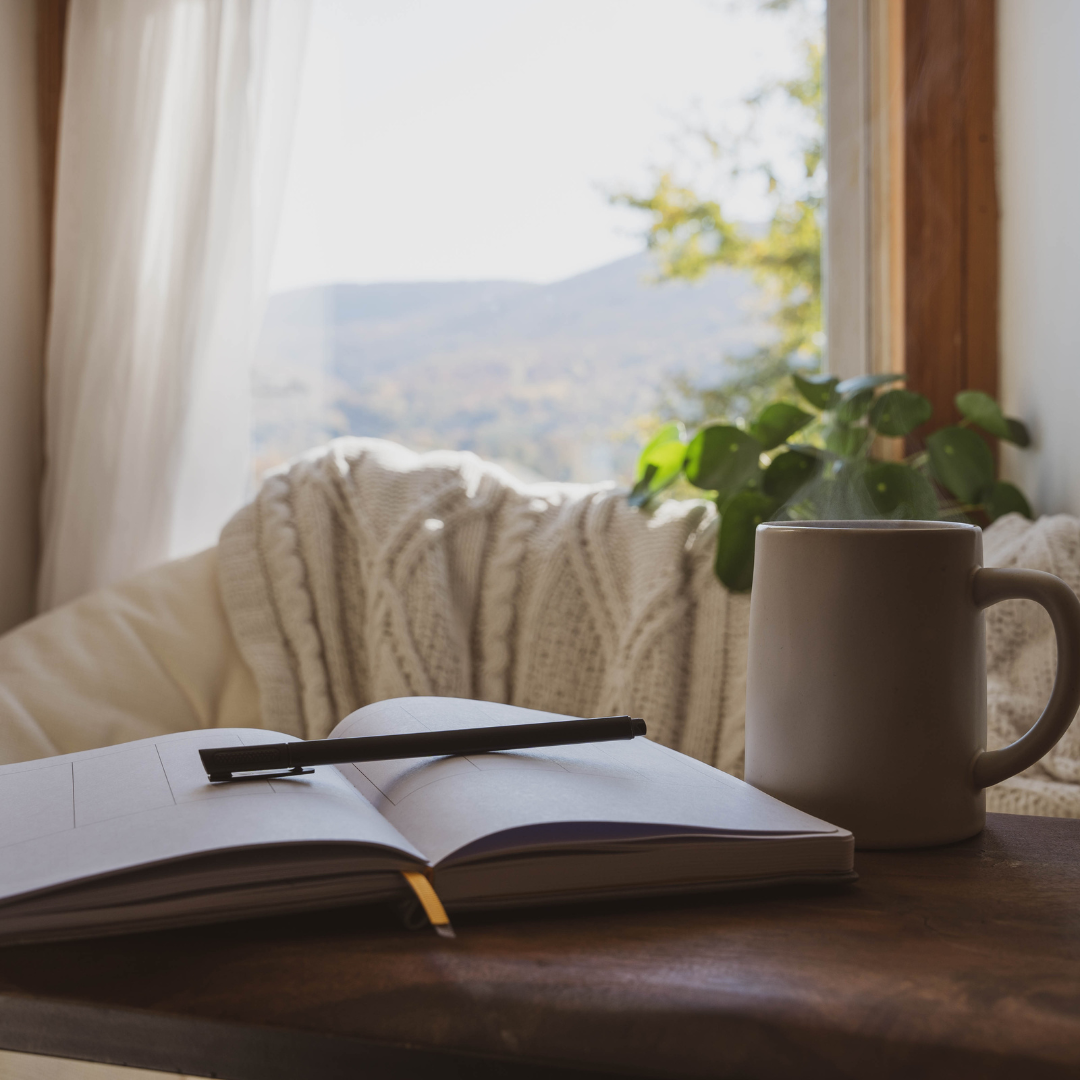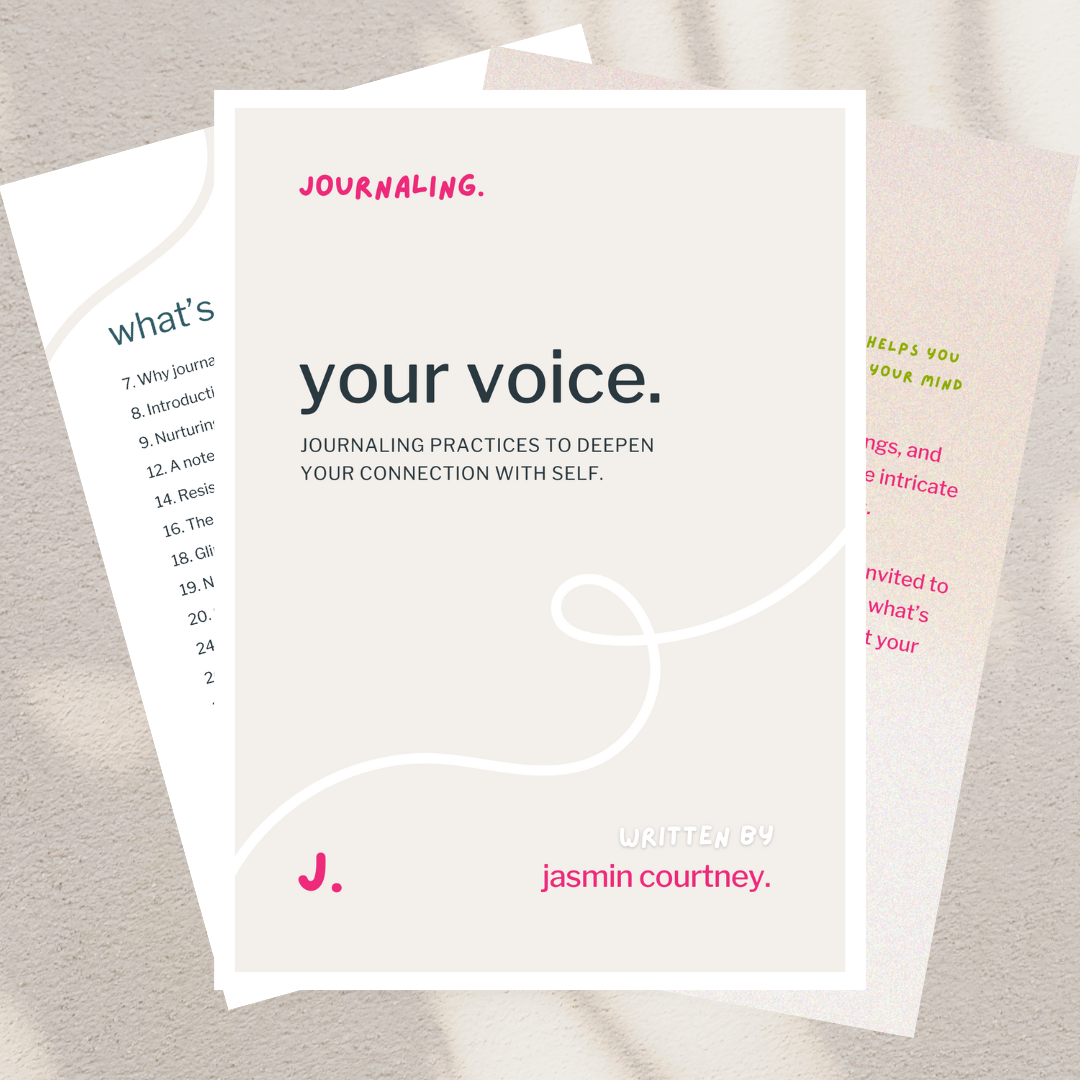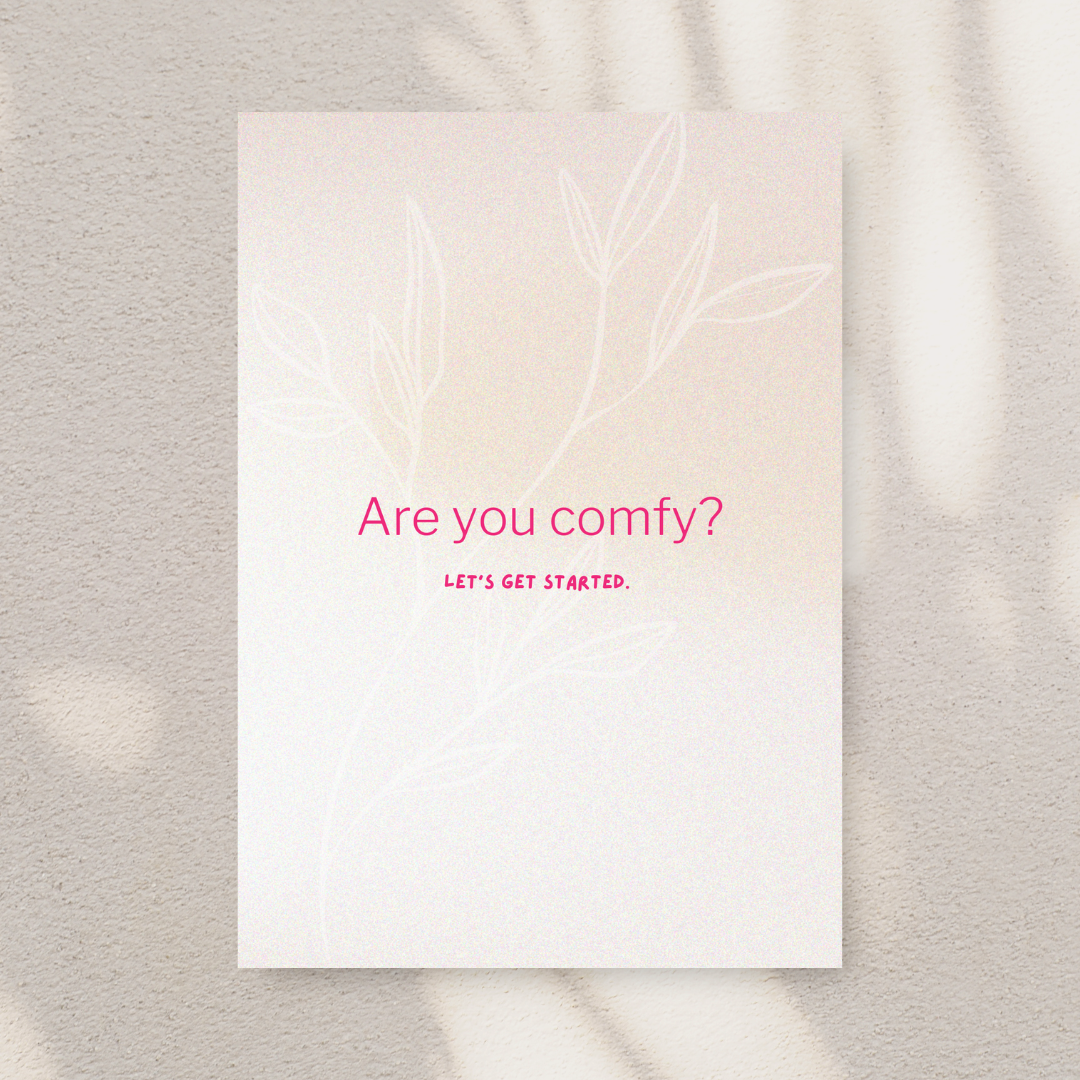How to start and sustain your own journal practice
Journal your truth. Discover your voice. Know your truest self.
How we talk to ourselves matters. How we express ourselves matters.
Yet, it can be hard to tune out the noise…
The noise of other people’s opinions.
The noise of societal norms.
The noise of our own inner critic.
Turning to the pages of your journal is one way to turn down the external noise and turn the volume up on your inner monologue - your truth.
Within the pages, you can take time to see where you are and what can be meaningful for you and your current or future paths.
You can cultivate a compassionate and loving inner voice who is always there with (and for) you!
You can express your voice without fear of judgement - without censoring - without compartmentalising parts of yourself.
This is a place where every part of you is welcome - the joyful, the sad, the angry, the ashamed, the celebrator, the critic, the evolving and changing YOU!
Why journal?
Journaling is one of the most effective ways to clear your mind and take insight and wisdom from your Inner world.
Expressive writing and journaling help us to process emotions and create internal space for growth - which can have positive ripples out to our emotional, mental, and even physical health.
Without this space to unpack and process the stories, fears, worries and joys we experience as humans, we can find ourselves stuck - unable to take action through the undigested experiences of our lives. Stuck reliving narratives and stories we carry with us, across generations - narratives we may have outgrown.
The art and science of journalling
There are numerous studies that have explored the value of expressive writing.
They reinforce what many of us experience - that journaling can have positive effects on our emotional, mental, and even physical health.
Beyond written forms of journaling and expression, there is also scientific research to show that the process of creating and making art is calming to our physiology.
A study by Girija Karmal (as mentioned in the book “Your Brain on Art”, by Susan Magsamen and Ivy Ross) found that as little as 45 minutes spent making art reduced the levels of the stress hormone, cortisol, in a significant number of participants.
Creating has been found to enhance self-efficacy, coping and emotional regulation, and to improve our physiology by lowering the stress response, which in turn enhances immune function and cardiovascular activity.
There are many more fascinating and impactful studies out there, and they are increasing in numbers everyday as our Western medical models start to catch up to what many have long known - that creative expression and making art are meaningful practices for our emotional, physical, psychological, social and spiritual wellbeing.
Cultivate your own journal practice and deepen your connection with self
Can I share some of my journaling story with you?
When I first began journaling, I wasn’t really sure what I was meant to be doing.
On the one hand, my inner perfectionist would tell me I wasn’t doing it right, and on the other hand, I would end up either: diarising (writing out the events of my day), or venting (pouring onto the page all the things that were troubling me)...
Personally, neither of these approaches worked for me.
Why?
I didn’t feel that diarising was building a deeper connection with myself (and without a strong ‘why’ I didn’t stick with my practice).
Venting often left me feeling worse than when I started - I would open up all the hurt or frustration and walk away from the pages feeling tired and exposed…and like nothing had shifted.
Maybe you can relate?
Here’s a few things that helped me to feel less pressured by and more excited for my morning journaling practice:
1) Dropping the idea that journaling has to happen a certain way to be effective
There are so many journaling practices out there - free writing, bullet journaling, gratitude journals, somatic flow journaling, reflective journaling…
It can be easy to feel like your own journal practice has to fit into one of these to be ‘right’.
Releasing the pressure to write a certain way and instead, opening up curious self-enquiry within my journaling has made all the difference - allowing me to create a practice that I WANT to turn to - to unpack, process, and explore things with myself. Adding in a nurturing voice to this process has also helped me to move through experiences, wrapping me in care along the way, so I can walk away from the pages feeling deeply supported…by…myself!
It has honestly been life changing.
I did The Artist’s Way approach of morning pages for a while. I loved it as a way to get started. Personally though I found 3 pages of stream of consciousness writing each morning a bit overwhelming to sustain.
Instead, letting my pen and paper go where they will - whether that is a sentence, a paragraph, a page, or maybe even 3 pages… has stopped my inner critic in its tracks and freed me up to actually find my flow with journaling.
It is now a practice I get so much out of that I want to turn up to my journal every morning and miss it when I don’t!
2) Making journaling a nurturing practice
This is a piece of the journaling puzzle that sometimes gets missed - how to bring in a supportive and nurturing voice to the practice of journaling thoughts, emotions and experiences onto the page.
Because, we’re not really journaling to no one - we are journaling both to the pages and to ourselves.
Without this piece, sometimes what happens is we bring a lot to the surface and out onto the page and end up walking away feeling a bit raw and exposed.
This nurturing voice is one way to offer yourself soothing guidance and reassurance - so you can walk away from the pages feeling held, seen and cared for.
If this feels a little strange at first, try imagining the nurturing voice is that of someone you trust, who speaks kindly to you.
PROMPT
How would they respond to you if you shared what you have written about with them?
Depending on your family of origin, this voice may be like a mothering voice, or a grandparents voice of support. For others, this voice may take on characteristics of a trusted mentor, friend, or therapist.
Try finishing your journaling sessions with this nurturing voice, so you’re walking away feeling witnessed and acknowledged in your experience. Here’s an example:
Here’s an example: I am feeling “full” and struggling to do. I think I’m afraid to start because I don’t feel confident that I can do this well…or do it at all. The thought of starting overwhelms me because then I have to do ALL the things that come with starting something new. I know once I do start, I’m usually ok, but I need TIME to ideate, draft, edit…so starting now helps me so much to have the time that supports my body and my mind to create. I think I’m also so tired. There has been so much going on that is asking me to be brave and to show up with clear boundaries. I’m worried that if I can’t start, then there will be people disappointed in me and I will feel like I’ve let everyone down. But there is still plenty of time and opportunity to move forward. I want you to know darling, that I see you trying your very best. You are safe - you can tend to your safety by making time to (add in ways you feel safe and supported). You are valued. You are enough. We want you to know these challenges don’t damage or change your worth at all! I think I can try that. I can take the first step today and then have space to rest. Remember, you are so so enough, right where you are. You do not need to “do” to prove this.”
If you’re finding the nurturing self challenging, please feel welcome to use this voice to start with - often starting somewhere breaks through that first barrier of it feeling weird or unknown, and this builds the momentum to find your own nurturing voice.
PROMPT
What are some of the supportive words or phrases that you long to hear?
Which ones will you try out during your next journaling session?
Nurturing yourself also includes the physical spaces you journal in, for example:
Choosing a quiet space where you feel comfortable and won’t be interrupted
The notebook and pen / app / or other form of expression you choose (it doesn’t matter what you choose - the process is just as powerful whether you’re writing in the most beautiful journal you’ve ever seen, or a piece of paper that was lying on the table)
Having water, tea and snacks ready
Placing blankets, pillows and anything else that makes you feel comfortable around you
You may want to situate yourself where you can see outside, or even sit outside if this feels good.
PROMPT
What is the process that helps me transition into my journaling practice?
Describe the physical space you will use and any sensory elements you will incorporate (like soothing scents, lighting, sounds, etc) and how these supportive elements around your journaling make you feel.
3) And remember, the most important piece of this journalling puzzle is always YOU
No matter where you are, what you have at hand to journal with, or the time of day… when you show up to the pages and express what’s sitting in your heart and on your mind, you will find your flow with journaling and deepen your connection with yourself.
What’s next?
If you have previously tried journaling and felt stuck diarising the events of your day, or venting your worries only to leave the pages feeling more stressed than you started, I have poured all of these learnings, prompts and practices into a resource for you - it’s called Your Voice - and it is a journaling companion to turn to when:
You want to start and sustain a meaningful journaling practice
You feel overwhelmed or lost by all you're thinking and feeling
You want to spend time exploring your dreams and passions
You need a friend - cultivate a compassionate and strong internal voice - who will always be there to support and guide you.
Ready to deepen your connection with your truest self, release difficult thoughts and feelings, and cultivate a compassionate and strong inner voice?
Learn more and get your copy of Your Voice: Self Discovery Journal Companion here.
Happy journaling!
Stay Connected
This Human Experience Newsletter
Occasional letters for cosy cuppa reading.
When you sign up to This Human Experience newsletter, I’ll share articles, books I’m reading, the occasional new offer or course, and gentle tips and reflections on creatively navigating this human experience.





